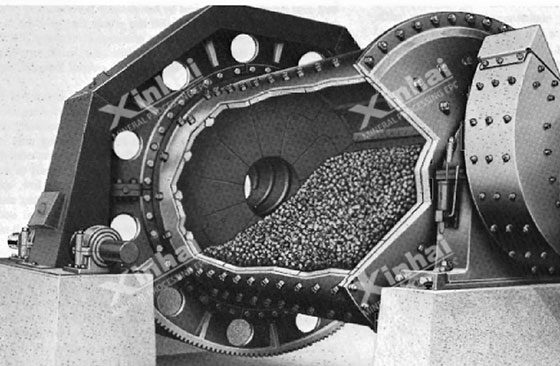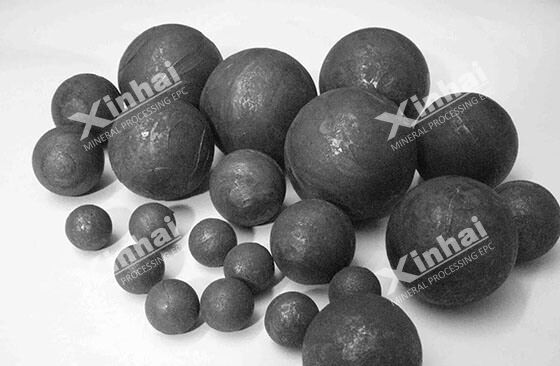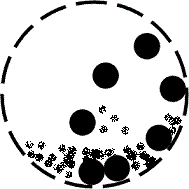
During the operation of the ball mill, steel balls are important grinding media and they play a vital role in the grinding process. The essence of grinding is the process of grinding and crushing raw ore to achieve the required particle size. As an important part of the grinding equipment, steel balls' performance and quantity selection directly affect the efficiency and operating cost of the entire grinding system. Therefore, this article will explore the impact of steel balls on the grinding process to optimize the operation of the grinding system, improve production efficiency and reduce costs.

The ball mill mainly uses steel balls to grind and peel materials. Therefore, the degree of filling of steel balls in the equipment naturally determines the strength of the grinding effect. From a physical perspective, the more steel balls are filled, the material can be ground and peeled multiple times. At the same time, the grinding area of the steel balls becomes larger, and the grinding effect is better. On the contrary, if the number of steel balls is reduced, the grinding area will be reduced, and the grinding effect will be better. weaken. From a mechanical perspective, when the number of balls loaded in the grinding equipment increases, the power consumption of the equipment increases and the productivity will also increase. On the contrary, the equipment productivity will decrease.
When the grinding equipment is working, the ball charge filling rate and the rotational speed of the grinding equipment work at the same time. When analyzing the impact of the filling rate, the rotational speed of the equipment cannot be forgotten. It is necessary to combine the two for joint analysis. When the equipment is at a lower speed, the ball charge forms an inclined surface inside the grinding equipment. The steel ball rises to the highest point and rolls down along the slope to form a cascading motion. As the filling rate increases, the inclined surface increases, and the ball load sliding moment increases, which in turn causes the grinding power to increase.

When the rotation rate of the grinding equipment and the steel ball filling rate are constant, the steel ball size will have a serious impact on the grinding product particle size characteristics, dissociation degree and consumption indicators, as follows:
(1) Affects the productivity of grinding equipment: When the size of the steel ball is too large, the number of strikes and grinding area of the material by the steel ball are reduced. If the size of the steel ball is too small, it will reduce the grinding and stripping effect of the material and thus reduce the productivity of the entire grinding operation. Therefore, it is necessary to accurately specify the diameter of the steel ball to improve the productivity of the equipment.
(2) Affects product particle size distribution: As mentioned above, oversized steel balls will reduce the grinding of materials. Under-grinding steel balls will increase the coarse-grained level of the ore, and oversized steel balls will also cause over-crushed materials. increase. Therefore, the granularity of the products ground and peeled by oversized steel balls is uneven, and there are many overly coarse and overly fine mineral particles, which is very detrimental to the sorting process.
(3) Affects the degree of dissociation of mineral monomers in grinding products: When the size of the steel ball is too large, the impact force of the steel ball on the ore increases, causing the ore to undergo penetration and crushing. Although the particle size of the ore becomes finer, the useful minerals and Gangue minerals are not highly dissociated. Just after determining the diameter of the steel ball, the degree of dissociation of useful minerals and gangue minerals increases.
(4) Affects ball consumption: The wear rate of the ball is proportional to its weight. The large ball wears quickly and consumes a lot of energy, while the small ball wears slowly and consumes less.
(5) Impact on power consumption: Ensure that the steel ball loading remains unchanged, and the power consumption of small balls is lower than that of large balls.
(6) Impact on the working noise of the mill: Due to the large energy of the big balls, the sound is also loud when they collide with each other or hit the lining plate.

The quality of steel balls not only affects productivity, but also affects ball consumption, which in turn affects the cost of grinding media. It is wrong to simply pursue high hardness and low unit consumption. High hardness and low unit consumption do not mean low cost. Balls with high hardness and low unit consumption are often very expensive. High hardness does not necessarily increase productivity, or even decrease it. Only high productivity can reduce various unit consumption indicators. Therefore, the primary criteria for selecting steel balls should be high mill productivity and low grinding media cost. Only high productivity and low grinding media cost can have good economic benefits.

During the grinding process, the steel balls themselves will also be worn by the ore, and the formed iron powder or iron flakes will remain in the slurry. If acid treatment is performed after grinding, the iron powder produced during the grinding process will first consume sulfuric acid, increasing the acid consumption. For this reason, some countries and regions use pebble mills to grind uranium or gold ores to reduce the impact of iron on subsequent wet chemical processes.
In the grinding process, the selection and use of steel balls are crucial to production efficiency and ore processing quality. By rationally selecting the material, size and quality of steel balls, the performance of the grinding equipment can be optimized to the greatest extent, the grinding efficiency of the ore can be improved, energy consumption can be reduced, and equipment maintenance costs can be reduced, thereby achieving continuous and stable operation of the production process. Therefore, we should pay full attention to the impact of steel balls on the grinding process and continuously optimize and improve it to better meet market demand.
To find out more about our products and solutions, please fill out the form below and one of our experts will get back to you shortly.